BHANGEELAAR! this morning [Saturday 04 December 2010] is telling the London Guardian about the serious deficit undermining claims of universal democracy in Britain, as witnessed over the promotion of an elected executive mayor installation in Tower Hamlets
You [The Guardian, London] say
[Quote]
“This case has provided the courts with another chance to make constitutional observations about its own role in the separation of powers system, following the recent decision of the supreme court in the parliamentary expenses case.This is interesting for lawyers but more importantly serves to shine a light on a formerly obscure but essential part of the constitutional system.”
[Unquote]
BHANGEELAAR! comment:
The overwhelming evidence of the practice across the UK is that the “electoral” aspects of “democracy” in the UK continue to remain very much outside the scrutiny of what should be properly constituted and properly active constitutional law courts, tribunals and other legitimate judicial forums.
This state of deficit against universally verifiable democracy has been reinforced by all the “existing agencies” “in place” in the context of the “directly elected executive mayor” in the “inner city” “[one of the most] deprived” London borough of Tower Hamlets.At every factual stage starting with the initial “petition” for a referendum on the matter of the change of the Council’s constitution to the latest “declaration of the election” to the “office of an executive mayor”, there have been allegations and claims of improper, illegal, dishonest or suspicious conduct.
Yet there has been no judicial or criminal law action taken about a single one of the allegations.
The “Electoral Commission” has not acted on the allegations that our campaign made.
No action has been taken as far as is publicly known so far under either the criminal law or under any known civil law provisions or under the electoral law about the reportedly serious assault suffered by one newspaper writer for the London newspaper The Independent who had been investigating allegations –that got reported by the Channel 4 News as well as by the BBC London news programmes in April and May 2010 - of voter registration fraud in Tower Hamlets.
0610 HrsSaturday04 December 2010
BHANGEELAAR!THE CAMPAIGN AGAINST AN ELECTED EXECUTIVE MAYOR IN TOWER HAMLETS
Guardian Legal Network
Previous Index
Court clarifies constitutional role in Woolas decision
Phil Woolas has lost his election court challenge but the decision shines a light on an obscure part of the constitutional system
Share
Comments (9)
Adam Wagner on the UK Human Rights blog, part of the Guardian Legal Network
guardian.co.uk, Friday 3 December 2010 18.45 GMT
Article history
The leaflet that cost Phil Woolas his Oldham East seat. The high court rejected Woolas's attempt to contest the finding of an election court. Photograph: PA
Phil Woolas has lost his appeal by way of judicial review of the decision to strip him of his election victory in Oldham East and Saddleworth in the 2010 general election. He has said he will not appeal the decision.
Mr Woolas had to first convince the administrative court, which handles judicial reviews of the decisions of public bodies, that it had jurisdiction to hear the claim. He won on this point. However, once it had accepted it could hear the case, the administrative court went on to uphold most of the decision of the election court.
Election courts are a somewhat obscure 1868 invention of Parliament. The are made up of high court judges and rule from time to time on whether election candidates are guilty of illegal practice. In this case, the question was whether Woolas had made or published "any false statement of fact in relation to the candidate's personal character or conduct".
On 5 November 2010 the election court held that Woolas had in fact acted unlawfully by making statements in relation to the personal character or conduct of his opponent Mr Watkins which amounted to an illegal practice. His victory was declared void. The last time an election court declared an election void was 99 years ago.
Mr Woolas strongly disputed the findings of fact, but he accepted there is no right of appeal or other means of challenging those findings. He applied to the administrative court to challenge the interpretation that the election court had given to the relevant statutory provision (section 106 of the Representation of the People Act 1983) contending that on a proper interpretation none of the statements was in relation to the personal character or conduct of Mr Watkins.
Woolas's judicial review application was initially rejected by Mr Justice Silber, who ruled that the judges convened as an election court were acting in their capacity as high court judges, and therefore not amenable to attack by way of judicial review. That application has now been reheard by a panel of three judges, Lord Justice Thomas, Mr Justice Tugendhat and Mrs Justice Nicola Davies DBE.
Can you review an election court decision?
On the first issue, the court disagreed with Mr Justice Silber, and ruled that a decision of the election court could indeed be judicially reviewed. This might represent a departure from the longstanding principle that a high court judge cannot be judicially reviewed, although given the unusual circumstances it probably will have little or effect on future decisions in relation to judicially reviewing high court decisions.
The court accepted that there was a need for finality in challenges to election decisions "for not only must the electors have a representative in Parliament, but in times where majorities are small, the absence of a Member can be significant" (para 46). However, just because a judgment of an election court is final and binding – it cannot be appealed – this does not mean it cannot be challenged if it is reached on the basis of a wrong interpretation of the law:
Although it is plain that Parliament intended that a lawful decision of the election court must be final in all respects, we do not consider that Parliament intended to provide that a decision that had been made on a wrong interpretation of the law cannot be challenged. An express provision to that effect would have been required. (para 47)
In other words, "final" need not necessarily mean final if, on occasion, that would lead to injustice.
The court also examined the constitutional relationship between the high court, the election court and the House of Commons. It accepted that the election court has "very limited jurisdiction" (para 32) but also that parliament probably intended that the high court was available to mop up any mistakes of law made by it. This was clear, said the court, from the terms of s.12 of the 1868 Act and s.144(4) of the 1983 Act (para 51). Moreover:
This is entirely consistent with the constitutional principle derived from the separation of powers and the rule of law that it is for the courts to determine the meaning of the law enacted by Parliament… Review by the courts of an issue of law arising out of a determination of an election court, in our judgment, far from being in any way inconsistent with the constitutional relationship between Parliament and the High Court, is what Parliament plainly regarded as entirely appropriate, as the rule of law requires interpretation of the law by the ordinary courts. (para 52)
The court went on to decide that it had wide powers to review any error made by an election court. And this review would be subject to appeal in the court of appeal if permission was granted.
Did the election court get it wrong?
Having decided that it had the jurisdiction to hear the case – an initial victory for Woolas – the court went on to uphold most of the election court's original decision.
It disagreed with the election court's decision that a false statement can at the same time relate both to a candidate's public and personal character (para 109). The central focus of the original legislation was to prevent candidates impugning the personal character of their opponents. This may relate, for example, to his "family, religion, sexual conduct, business or finances" (para 112).
However, a statement about a political position "can go beyond being a statement about his political position and become a statement about the personal character or conduct of a candidate" (para 114). This is clearly a difficult and potentially slippery definition, but one which parliament has decided that the courts should examine in light of particular facts and allegations.
With this in mind, the court ultimately upheld two of the three findings of unlawful behaviour by the election court. The finding it rejected related to the statement that Mr Watkins had reneged on a promise in respect of a political position in Choose magazine. The statement in Choose, ruled the court, was not a statement in relation to the personal character or conduct of Mr Watkins. Although it was a statement that implied he was untrustworthy, it was a statement in respect of his political position.
However, the statements in The Saddleworth and Oldham Examiner and Labour Rose went beyond being statements in relation to Mr Watkins' political position as to wooing extremist voters, to being a statement in relation to his personal character in that he was a man who condoned extreme violence.
As such, the court upheld the election court's decision. Even if it had rejected two out of the three findings of unlawful behaviour by Woolas, this would still have been enough to strip him of his election victory. One would have been enough.
Human right to freedom of expression
In respect of human rights, the court accepted that article 10 of the European Convention on Human Rights (the right to freedom of speech) mandates a strict approach to such cases involving s.106 (para 89 onwards):
It is necessary to consider how, taking these decisions into account, an election court should determine whether a statement relates to the candidate's personal character or conduct. The determination involves no discretion, but it does require judgment, which might be referred to as a value judgment. It is in the carrying out of this judgment that the court could, and in our judgment should, give effect to its obligation to have regard to the Article 10 rights of the maker or publisher of hte statement (and the other Convention rights which must be balanced with or against it). (para 103)
The court's reasoning is quite difficult to follow, and may leave open the potential to appeal. However, its conclusion on human rights was clearer, and is difficult to dispute. It held that the right to freedom of expression "does not extend to the publishing, before or during an election, of a statement that is made dishonestly" (para 106). What matters in respect of freedom of expression is not whether the statement was about a person's personal or political character, but rather whether the statement was dishonest. Section 106 is more limited than even this – its scope only extends to false statements made in relation to personal character or conduct – but the fact remains that lies are not subject to human rights protections.
Comment: not all bad for Mr Woolas
Although Mr Woolas will be disappointed that his election victory is still void, he did succeed in getting his case heard in the first place. This seems like the right decision. It is of great importance that election court decisions are taken quickly, and are final in most cases. However, it would be surprising if they were never open to review by any court, even if a judge made a gross error of law in coming to his decision. This would go against the basic principles of the justice system and is surely too harsh even when decisions need to be quick.
The administrative courts are used to making decisions which can have huge effects on the operation of public bodies, and to that end applications must be made within three months, as opposed to the 6 years a claimant has to bring a claim in most civil disputes. They are generally dealt with fairly speedily, although this can vary depending on the workload of the courts. But decisions are still subject to appeal, and this means that errors of law – but only errors of law – can be examined and corrected if necessary. In respect of speed, it is to be expected that any decision of an election court will be given top priority and therefore dealt with quickly.
An effect of the administrative court's decision is that since Mr Woolas has been accepted into the ordinary judicial review system, rather than being trapped in the odd single-shot election court system as Mr Justice Silber had initially ruled, this means that he has the chance to appeal. If he chooses to (which may be unlikely given his comments following the decision) and is granted permission, given the urgency this may be a candidate to be 'leapfrogged' straight to the Supreme Court. So the decision may still be reversed, although given the unattractive and somewhat seedy factual circumstances surrounding the election brochures and adverts, he may well be unsuccessful again.
This case has provided the courts with another chance to make constitutional observations about its own role in the separation of powers system, following the recent decision of the supreme court in the parliamentary expenses case. This is interesting for lawyers but more importantly serves to shine a light on a formerly obscure but essential part of the constitutional system.
Printable version
Send to a friend
Share
Clip
Contact us
larger smaller
Politics
Phil Woolas
Law
Series
Guardian Legal Network
More from Guardian Legal Network on
Politics
Phil Woolas
Series
Guardian Legal Network
More comment
More analysis
Related
10 Nov 2010
Phil Woolas is Labour's fall guy Dan Hodges
14 Sep 2010
Phil Woolas denies he made up death threat claims
2 Jun 2009
Would-be terrorists don't choose bogus colleges, says minister
2 Jun 2009
A bill to strengthen Britain's borders Phil Woolas
Printable version
Send to a friend
Share
Clip
Contact us
Article history
google_ad_client = 'ca-guardian_js';
google_ad_channel = 'law';
google_max_num_ads = '3';
Ads by Google
Barrister in London
No surprises. Fixed fees. Access a barrister directly
http://googleads.g.doubleclick.net/aclk?sa=L&ai=BM7LqAdz5TIO-HuLTjQep_bTzBLXom6cB4_i4hBXAjbcBoMIeEAEYASCFu-gPKAM4AFDEiLnz-v____8BYLu-roPQCrIBEnd3dy5ndWFyZGlhbi5jby51a8gBAdoBZmh0dHA6Ly93d3cuZ3VhcmRpYW4uY28udWsvbGF3LzIwMTAvZGVjLzAzL3dvb2xhcy1hbmFseXNpcy1lbGVjdGlvbi1jb3VydC1qdWRnbWVudD9zaG93YWxsY29tbWVudHM9dHJ1ZYACAakCsLfUDm1quj6oAwHoA7MI6ANM6ANL9QMCAAAE&num=1&sig=AGiWqtzUDVkb4GKj9-G6WPHMQAY_ViTDBQ&client=ca-guardian_js&adurl=http://www.theaccessiblebarrister.com
Rights Upon Separation
How to revert to your maiden name upon separation in the UK.
http://googleads.g.doubleclick.net/aclk?sa=L&ai=B_HkXAdz5TIO-HuLTjQep_bTzBMyc8aQBjMeP7QLAjbcB8PZlEAIYAiCFu-gPKAM4AFCqv6O8_f____8BYLu-roPQCrIBEnd3dy5ndWFyZGlhbi5jby51a8gBAdoBZmh0dHA6Ly93d3cuZ3VhcmRpYW4uY28udWsvbGF3LzIwMTAvZGVjLzAzL3dvb2xhcy1hbmFseXNpcy1lbGVjdGlvbi1jb3VydC1qdWRnbWVudD9zaG93YWxsY29tbWVudHM9dHJ1ZagDAegDswjoA0zoA0v1AwIAAAQ&num=2&sig=AGiWqtz-D5c_Y-BpTC-V16zKQ3Xc-vmi8w&client=ca-guardian_js&adurl=http://www.ukdps.co.uk/AWomansRightsUponSeparation.html
Local Lawyer Guide
Independent star rated guide to good lawyers in your area
http://googleads.g.doubleclick.net/aclk?sa=L&ai=Bbi7SAdz5TIO-HuLTjQep_bTzBP6c29oB3qq_jxLAjbcBwJM4EAMYAyCFu-gPKAM4AFCg6uDg-P____8BYLu-roPQCrIBEnd3dy5ndWFyZGlhbi5jby51a8gBAdoBZmh0dHA6Ly93d3cuZ3VhcmRpYW4uY28udWsvbGF3LzIwMTAvZGVjLzAzL3dvb2xhcy1hbmFseXNpcy1lbGVjdGlvbi1jb3VydC1qdWRnbWVudD9zaG93YWxsY29tbWVudHM9dHJ1ZakCsLfUDm1quj6oAwHoA7MI6ANM6ANL9QMCAAAE&num=3&sig=AGiWqtxulx1LQ6HucSOSO3h_6gl6jf9sgA&client=ca-guardian_js&adurl=http://www.goodlawyerguide.co.uk
//
google_protectAndRun("render_ads.js::google_render_ad", google_handleError, google_render_ad);
's comment
//
var coreContentCommentCount = 9;
Comments in chronological order (Total 9 comments)Post a comment
Staff
Contributor
spasuit
3 December 2010 7:00PM
This is an inportant decision, not for the odious Woolas but for the rest of us. Character assassination and smearing have no place in a political fight.
Recommend? (13)
Report abuse
Link
spasuit
3 December 2010 7:01PM
Important sorry.
Recommend? (0)
Report abuse
Link
RussJ
3 December 2010 7:31PM
What is it with Labour MP's, why do they think they are above the law? Justice for a change. The revolting man thought he could stuff the Gurkhas and high court juges and lost, thank god.
One less pompous, arrogant, smug, egotistical ignorant vacuous MP. What a great day with another one gone, Chaytor.
Once the other thieves (maybe up to 300) get taken in front of the judges and dealt with, perhaps the taxpayer will get a more decent parliament.
Recommend? (6)
Report abuse
Link
carlgardner
3 December 2010 7:32PM
I think the judgment has a deeply worrying aspect.
The judges conclude that a statement must be either political or personal. It can't be both. And they say that most political statements made in an election campaign are just that - and they aren't against election law, even if they're deliberate lies.
But if you accuse your opponent of condoning serious violence, then your statement becomes "personal" - and so if you carelessly say something wrong about that, you can be barred from parliament even if you honestly believed it.
What this means is that an Islamist extremist candidate (for example) may under electoral law be able to lie about whether his opponent supports war on Iran, for instance. But his opponent may be barred from parliament if he honestly believes the Islamist had said things that amount to support for Al Qaeda, but carelessly misinterprets them and so gets it wrong.
There has to be something wrong with that disparity.
Recommend? (3)
Report abuse
Link
VoxAC30
3 December 2010 7:47PM
I'm sure justice has been done but the Fim Dems are on pretty thin ice portaying themselves as guardians of truth and paragons of virtue.
Recommend? (6)
Report abuse
Link
rfyork
3 December 2010 8:48PM
I hope we have seen the last of this thoroughly obnoxious little creep. He was an abject failure as a politician and as a minister and his claim for tampons and panty liners on expenses proved him to be an abject failure as a human being.
Recommend? (4)
Report abuse
Link
Swan17
3 December 2010 10:07PM
'Not all bad for Woolas'? Getting this raised and essentially approved of again is surely very bad for Woolas. Another Court has agreed that his actions were totally unacceptable and broke the Law. And on the same day that one of the Labour ex-MP's finally accepted that he could not hid any further and admitted his guilt.
Surely this is very bad for Labour. Is this enough for Ed to finally agree with Harman or will he still hide behind her?
Recommend? (1)
Report abuse
Link
richardcalhoun
4 December 2010 1:17AM
This is excellent news.
Woolas flagrantly broke the rules and lied.
The result is good for democracy, and a win for honesty.
Recommend? (0)
Report abuse
Link
Notoanexecutivemayor
4 December 2010 6:10AM
You say
“This case has provided the courts with another chance to make constitutional observations about its own role in the separation of powers system, following the recent decision of the supreme court in the parliamentary expenses case. This is interesting for lawyers but more importantly serves to shine a light on a formerly obscure but essential part of the constitutional system.”
The overwhelming evidence of the practice across the UK is that the “electoral” aspects of “democracy” in the UK continue to remain very much outside the scrutiny of what should be properly constituted and properly active constitutional law courts, tribunals and other legitimate judicial forums.
This state of deficit against universally verifiable democracy has been reinforced by all the “existing agencies” “in place” in the context of the “directly elected executive mayor” in the “inner city” “[one of the most] deprived” London borough of Tower Hamlets.
At every factual stage starting with the initial “petition” for a referendum on the matter of the change of the Council’s constitution to the latest “declaration of the election” to the “office of an executive mayor”, there have been allegations and claims of improper, illegal, dishonest or suspicious conduct. Yet there has been no judicial or criminal law action taken about a single one of the allegations. The “Electoral Commission” has not acted on the allegations that our campaign made. No action has been taken as far as is publicly known so far under either the criminal law or under any known civil law provisions or under the electoral law about the reportedly serious assault suffered by one newspaper writer for the London newspaper The Independent who had been investigating allegations –that got reported by the Channel 4 News as well as by the BBC London news programmes in April and May 2010 - of voter registration fraud in Tower Hamlets.
0610 Hrs
Saturday
04 December 2010
BHANGEELAAR!
THE CAMPAIGN AGAINST AN ELECTED EXECUTIVE MAYOR IN TOWER HAMLETS
Recommend? (0)
Report abuse
Link
Friday, 3 December 2010
Subscribe to:
Post Comments (Atom)














![Kay Jordan marched in Hanbury Street, Princelet street on 17 January 2006 [pictured below]](https://blogger.googleusercontent.com/img/b/R29vZ2xl/AVvXsEjmFpkcZgAW1eZKWId6O-xApvo7_zu4rL0QLz_ByB_FHaKbyUkAFfaPT1RdxXqjX-YVvveRu2zdPyr0pXqiFK-0SAjQd5vyTwGgGDnyU600Gk-gu-MueRhRIg_UhFT66fo8gzCl2tM4BX-8/s760/KHOODEELAAR%2521+No+to+Crossrail+Hole%252C+Demo+in+Hanbury%252C+Spelman%252C+Princelet+Streets+and+Brick+Lane+London+E1+17+January+2006.jpeg)
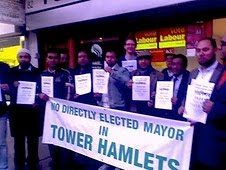
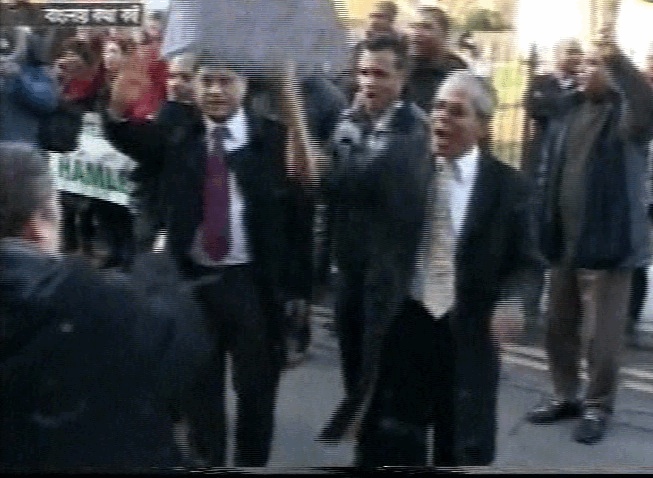



















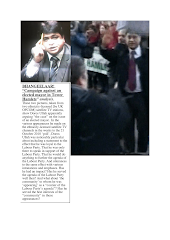
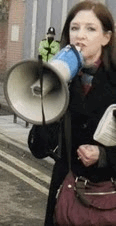

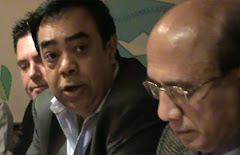

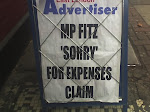
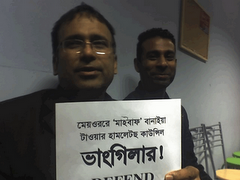
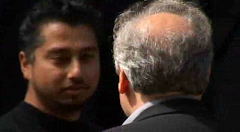
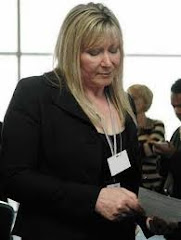
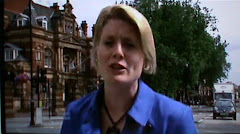
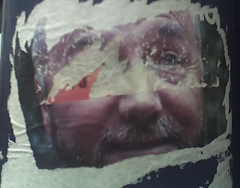

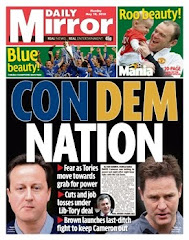
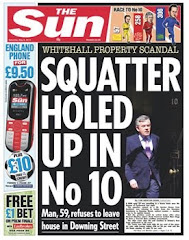
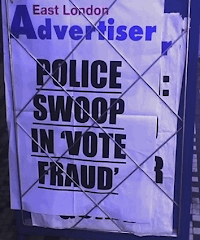
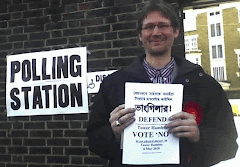
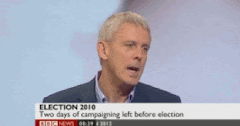
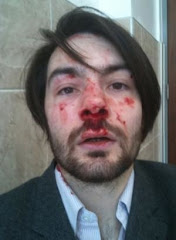
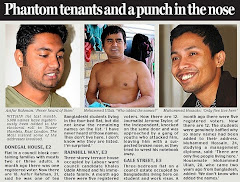
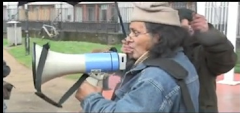


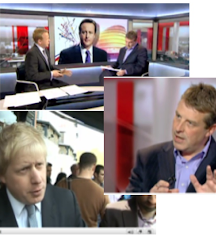
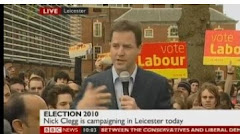
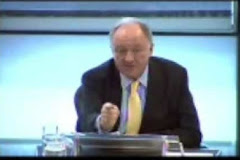
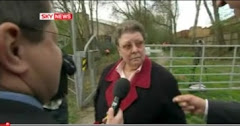

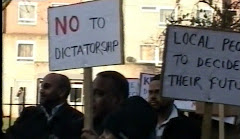
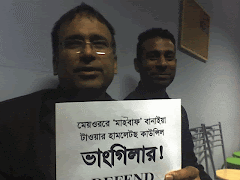

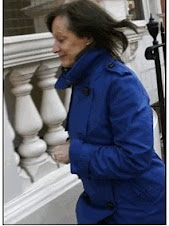
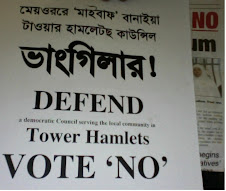
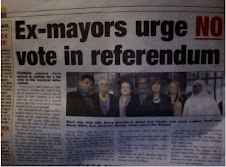
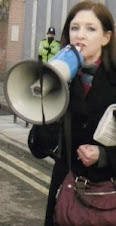
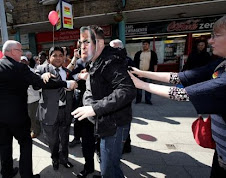
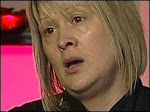
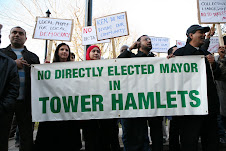



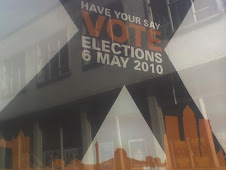
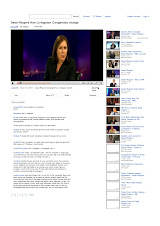
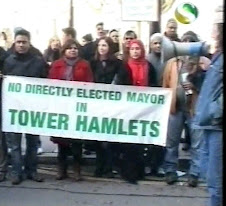
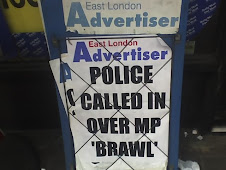
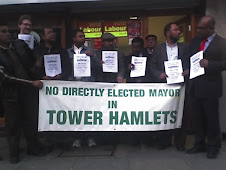
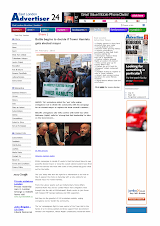
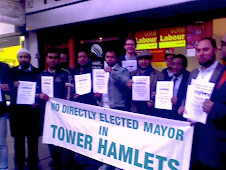
No comments:
Post a Comment